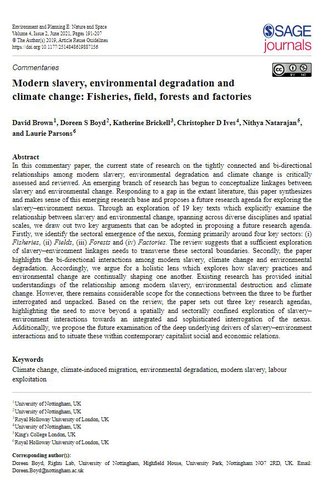Modern slavery, Environmental Degradation and Climate Change: Fisheries, Field, Forests and Factories (India)
2019
- Author
- Brown D, Boyd D S, Brickell K, Ives C D, Natarajan N & Parsons L
- World region
- South Asia
- Origin of migration
- India
- Area of transit
- No data available
- Destination of migration
- India
- Who is affected
- Agricultural communities
- Type of climatic event
-
Rapid-onset event, Slow-onset event
The effects of climate change reduce agricultural production.
- Type of migration/mobility
-
Internal, Rural to urban
Farmers are recruited by brick kiln contractors during the off season and end up tied to the brick kilns.
- Destination industry or sector
-
Brick kilns
- Type of modern slavery
-
Debt bondage
Workers receive an advance payment from their employer for food and other basic needs. They must then pay off this debt through their work.
- Link between climate change, migration and modern slavery
- Indirect
- Key vulnerability factors
- N/A
- Summary
-
This source focuses on the links between modern slavery and environmental change in fisheries, fields, forests and factories specifically. The authors recognise the role of capitalism in fuelling environmental degradation, climate change and exploitative business practices (e.g. logging/deforestation or brick kilns), which exacerbate modern slavery. They advocate for a more interconnected analysis of the issues to further our understanding of the links between environmental change and modern slavery.
- Recommendations
-
This report identifies a series of gaps in the research. For instance, more research is needed on: the cyclical relationship between environmental degradation, climate change and labour exploitation in the fishing sector in different locations; the risk of modern slavery in immobile agrarian communities in rural areas; the links between climate-induced environmental degradation in Cambodia and the prevalence of debt-bonded labour in Thai fisheries; and the links between climate-induced migration and modern slavery in brick kilns in South Asia, as well as other manufacturing sectors.



